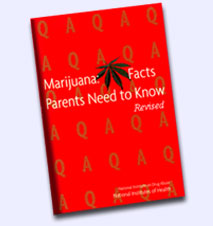 |


 Q: Why do young people use marijuana? Q: Why do young people use marijuana?
A: Children and young teens start using marijuana for many reasons. Curiosity and the desire to fit into a social group are common reasons. Certainly, youngsters who have already begun to smoke cigarettes and/or use alcohol are at high risk for marijuana use.
Also, our research suggests that the use of alcohol and drugs by other family members plays a strong role in whether children start using drugs. Parents, grandparents, and older brothers and sisters in the home are models for children to follow.
Some young people who take drugs do not get along with their parents. Some have a network of friends who use drugs and urge them to do the same (peer pressure). All aspects of a child’s environment—home, school, neighborhood—help to determine whether the child will try drugs.
Children who become heavily involved with marijuana can become dependent, making it difficult for them to quit. Others mention psychological coping as a reason for their use—to deal with anxiety, anger, depression, boredom, and so forth. But marijuana use is not an effective method for coping with life’s problems, and staying high can be a way of simply not dealing with the problems and challenges of growing up.
Researchers have found that children and teens (both male and female) who are physically and sexually abused are at greater risk than other young people of using marijuana and other drugs and of beginning drug use at an early age.
 Q: Does using marijuana lead to other drugs? Q: Does using marijuana lead to other drugs?
A: Long-term studies of high school students and their patterns of drug use show that very few young people use other drugs without first trying marijuana, alcohol, or tobacco. Though few young people use cocaine, for example, the risk of doing so is much greater for youth who have tried marijuana than for those who have never tried it. Although research has not fully explained this association, growing evidence suggests a combination of biological, social, and psychological factors is involved.
Researchers are examining the possibility that long-term marijuana use may create changes in the brain that make a person more at risk of becoming addicted to other drugs, such as alcohol or cocaine. Although many young people who use marijuana do not go on to use other drugs, further research is needed to determine who will be at greatest risk.
Q: What are the effects of marijuana?
A: The effects of marijuana on each person depend on the:
- type of cannabis and how much THC it contains;
- way the drug is taken (by smoking or eating);
- experience and expectations of the user;
- setting where the drug is used; and
- use of other drugs and/or alcohol.
Some people feel nothing at all when they first try marijuana. Others may feel high (intoxicated and/or euphoric).
It is common for marijuana users to become engrossed with ordinary sights, sounds, or tastes, and trivial events may seem extremely interesting or funny. Time seems to pass very slowly, so minutes feel like hours. Sometimes the drug causes users to feel thirsty and very hungry—an effect called “the munchies.”
|
| << Previous
Page |
Index |
Next Page >> |
|
 |

Marijuana: Facts for Teens (Revised)
La marihuana - Información para los adolescentes (Versión
Revisada)
Marijuana: Facts Parents Need to Know (Revised)
La marihuana: Lo que los padres deben saber (Versión
Revisada)
These publications may be reprinted without permission.
|
|